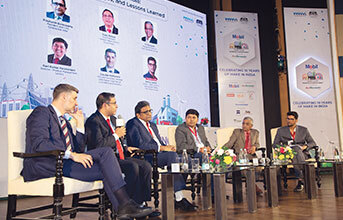
Make in India would be soon completing 10 years; however, the initiative has been making a huge impact on the manufacturing industry. In a recent panel discussion on "A Decade of Make in India: Achievements, Challenges, and Lessons Learned," industry leaders deliberated and reflected on key achievements, advancements, and challenges encountered throughout this decade-long journey of Make in India, delving into its forward-looking perspective.
The panel, moderated by Rahul Kamat, Editor – B2B Division, Worldwide Media, comprised industry stalwarts such as Prashanth Doreswamy, President and CEO, Continental India; Ravi Kumar Kanakarajan, Director - Product Management, Lenovo; Sujay Baisya, Vice President – Indirect Sales (North), ExxonMobil; TK Ramesh, Managing Director, Ace Designers Group; and Claudio Maffioletti, CEO and Secretary-General, Indo-Italian Chamber of Commerce and Industry.
The discussion began with Prashanth Doreswamy, President, and CEO of Continental India, reflecting on the progress over the past decade. He emphasised that Make in India is an ambitious policy aimed at positioning India as a global manufacturing hub. Currently, manufacturing constitutes 16.5 per cent of the GDP, with a target of reaching 23 per cent within the next five years. To drive this growth, Doreswamy stressed the importance of government policies and the affordability of technology in India's value-driven market.
He also emphasised the need to bridge the skill gap in India's growing workforce. Despite the country's high number of science and mathematics graduates worldwide, there's a significant mismatch between their academic qualifications and industry readiness. Moreover, Doreswamy called for a more nationalistic approach in domestic manufacturing while discussing the necessity to uplift the SME sector. He highlighted the challenge of research and development (R&D) for MSME industries and suggested shifting the approach from sole reliance on upfront subsidies towards enhancing the competitiveness of SMEs.
Claudio Maffioletti, CEO, and Secretary-General of the Indo-Italian Chamber of Commerce and Industry underscored the role of Italian companies in fostering growth within India. With over 750 Italian companies and 4,000 productive plants in India, the country has been a destination for Italian investments, particularly in the machinery and engineering sectors. However, Maffioletti raised concerns regarding India's increasingly protectionist stance, hindering global partnerships. He proposed breaking this protectionist barrier through strategic alliances between regions, stressing the important role of politics in initiating this change. Maffioletti envisioned India evolving into a global R&D development hub, leveraging its technological expertise combined with manufacturing capabilities to increase its share in global exports. "Despite India's population of 1.4 billion people, India's share of global exports is about 1.5 per cent. The quality of exports must improve, and international collaborations will play a pivotal role in this," said Maffioletti.
Sujoy Baisya, Vice President of Indirect Sales (North) at ExxonMobil, addressed the growing importance of sustainability in manufacturing. He highlighted ExxonMobil's recent investment of 1,000 crores in establishing the first green plant in Mumbai as proof of the company's commitment to innovation and low-carbon technologies. He highlighted the necessity of investing in research and innovation to address sustainability challenges while simultaneously tackling the issue of upskilling labour to meet the demands of a growing manufacturing sector. TK Ramesh, Managing Director of Ace Designers Group, underlined the need to make manufacturing an appealing career choice for the younger generation. Recognising the stagnant percentage of GDP contributed by manufacturing, Ramesh stressed the importance of instilling a sense of purpose and excitement around manufacturing to attract the right talent. He stressed the crucial role of the next three to five years in reshaping the perception of manufacturing among the youth.
Ravi Kumar Kanakarajan, Director of Product Management at Lenovo, echoed optimism for India's manufacturing landscape. Kanakarajan highlighted the importance of increasing manufacturing capacity to meet growing consumer demands, citing Lenovo's journey from earlier catering to the Indian market to now becoming a global exporter. He emphasised the need for continued investments in India to support manufacturing capabilities and facilitate exports to the rest of the world. He mentioned that the quality of exports will play a huge role in determining India's position as a manufacturing hub on the global stage. He talked about the importance of investing in innovation to elevate the quality of exports to meet global standards.
Throughout the discussion, the panel spoke about the importance of addressing challenges such as skill gaps, sustainability, and international collaboration to unlock the full potential of Make in India in the next 10 years. Skill enhancement emerged as a key highlight of the discussion, with a mutual consensus that India's workforce must be adequately equipped to meet the demands of the manufacturing industry.
From upskilling initiatives to educational reforms, efforts will be required to ensure that our workforce is prepared for the challenges ahead. Innovation and R&D were among the key topics discussed throughout the session, highlighting the importance of staying ahead in an increasingly competitive global market. The panel concluded with panellists and the moderator agreeing on the fact that there is a need for a collective effort from both the government and industry stakeholders to take this sector to new heights and that the next decade holds exciting prospects for India's manufacturing industry.



























